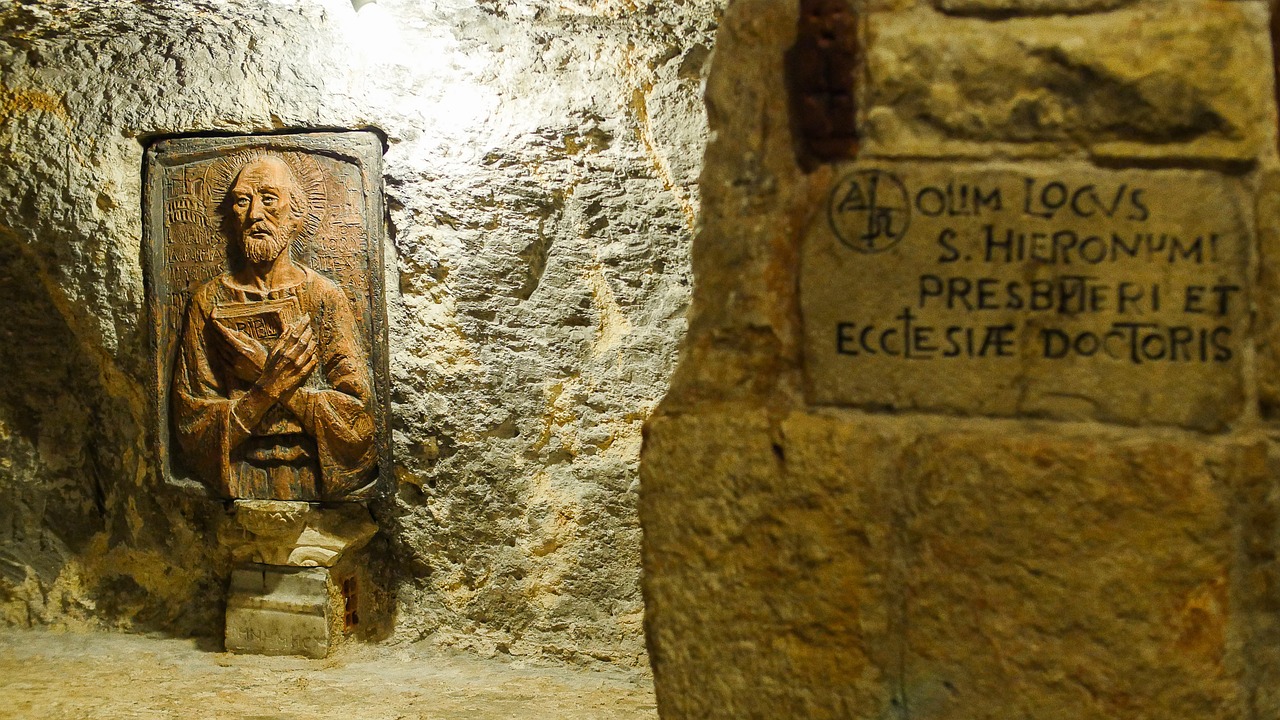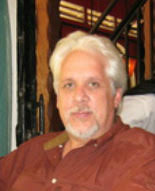
–St Jerome’s cave, beneath the Church of the Nativity, Bethlehem, Israel, please click on the image for greater detail.

-by Ken Hensley
For many years I believed that what we Catholics refer to as the Holy Eucharist was something very different.
It was the “Lord’s Supper” to Baptists and other Evangelicals. We viewed it as a simple meal of remembrance and recommitment.
Jesus had said, “Do this in remembrance of me.” St. Paul had written, “For whenever you eat this bread and drink this cup, you proclaim the Lord’s death until he comes” (1 Cor. 11:26). And in the thinking of essentially every Christian I knew, this was the sum of it: the Lord’s Supper was a time for calling to mind what our Lord had suffered for us, giving thanks, recommitting our lives to Him and by the sacred use of bread and wine proclaiming the Lord’s death until He comes again.
Of course, we believed Jesus was “with us” in the breaking of the bread, but not in any sense substantially different than He is with us all the time. Certainly there was no “miracle” taking place by which bread and wine were changed in any way. No. The bread and wine were mere symbols, the bread depicting Christ’s broken body, the cup his shed blood.
With this view, although it was common for an ordained minister to lead in the celebration of the Lord’s Supper, and for it to be celebrated in the church and during the Sunday worship service – once a month, once each quarter depending on the church – this wasn’t in any sense required. Indeed, it was common in the evangelical circles I was familiar with for adults, young adults, even teenagers, to celebrate the Lord’s Supper at youth camps and retreats, using whatever elements they had available.
Once I heard about potato chips and Coke being used.
Now, I don’t mean to say that the Lord’s Supper wasn’t treated as important, or meaningful, because it was. It was a solemn time. But like reading the Bible, or singing a hymn, or praying, it just wasn’t something regular Christians couldn’t do when and where they liked. Again, it’s not like some special miracle of some sort was taking place!
Calvin’s Conception
At some point along the way, the teaching of John Calvin on this subject began to intrigue me.
He spoke of the Lord’s Supper as a special “means of grace” in which Christ is not merely remembered and proclaimed, but is present in a special “spiritual” sense. He said that in communion Christ gives himself to us as “spiritual food” and that in communion we Christians “feast” upon Christ our Passover Lamb, that we “partake” of Him.
Now, Christ is the only food of our soul, and therefore our heavenly Father invites us to Christ, that, refreshed by partaking of him, we may repeatedly gather strength until we shall have reached heavenly immortality (Institutes of the Christian Religion Book IV, Chap XVII.1).
Of course Calvin was eager to emphasize that this was a “spiritual” feasting and not anything like what Catholics believe.
I was intrigued by this idea. And while I knew there were a number of New Testament passages that might – might! — support such a notion (we will return to these later in this series), I didn’t think Calvin’s view could be established with any degree of certainty from the data of the New Testament alone.
What was clear to me – what I thought could be clearly demonstrated from the pages of the New Testament – was that in the Lord’s Supper we remember, we recommit, we proclaim.
The New Hampshire Confession of Faith, a Baptist Confession drawn up in 1833, spoke of
The Lord’s Supper, in which the members of the church, by the sacred use of bread and wine, are to commemorate together the dying love of Christ; preceded always by solemn self-examination.
I was happy to stick with this simple definition.
A Friend’s Conversion
About eight years into my pastoral ministry, I learned that an old acquaintance from seminary days had become Catholic.
I listened to his recorded conversion story and I still remember physically wincing when he spoke of receiving Christ in the Eucharist, “body, blood, soul and divinity.” The idea was so entirely foreign to me. In truth, I felt a little sick thinking about it.
This doctrine of the “Real Presence” of Christ in the Eucharist was completely alien to the evangelical world in which I had learned the faith and in which I lived and ministered.
Yes, I was aware that this “view” was anything but foreign to hundreds of millions of Christians from the Catholic, Orthodox, Anglican and Lutheran traditions. Martin Luther himself defended to the end a doctrine of the Real Presence. But none of these Christian denominations, I would have insisted, had adhered faithfully to the practice of sola scriptura.
If they had developed their theology of the Lord’s Supper directly – and solely! – from the teaching of the inspired Word of God, the Bible, they would never have embraced such nonsense.
Although I felt secure that I stood with Holy Scripture on this subject, there was one thing my old acquaintance said in his conversion story that made me sincerely curious.
He claimed that the Real Presence of Christ in the Eucharist had been the faith of the Church from the beginning.
The Testimony of the Fathers
Now, my assumption had always been that these “magical” views of the Lord’s Supper (baptism as well, but that’s another subject) must have arisen slowly over the course of several centuries as the Church incrementally strayed from a strict adherence to the Bible alone. Now I was being told that this wasn’t the case.
So what was the truth? What did Christians in the earliest centuries after the apostles believe about the Lord’s Supper?
I began for the first time in my Christian life to read the early Church fathers and to really listen to what they had to say.
In A Plea for the Christians (circa A.D. 170) Athenagoras, one of the earliest Christian apologists, wrote to answer certain charges that were being hurled against the early Christians. Besides being accused of “atheism” (because they rejected the gods of the Greek and Roman pantheons), and of participating in sexual orgies (because they were known to “love one another” and greet each other with a “holy kiss”), the pagans accused the early Christians of practicing cannibalism.
Why? Because it was known that in their clandestine meetings the Christians gathered to celebrate a secret meal, during which they would eat the flesh and drink of the blood of a human being.
Athenagoras mentions that the Christians were accused of celebrating “Thyestian Feasts” — a reference to Greek mythology, where Atreus, motivated by revenge, killed the children of his brother Thyestes and served them to him for dinner. Thus the charge of cannibalism.
The charges of course were nonsense—although after reading the language the early bishops, theologians and apologists routinely used to describe the Eucharist, I had to admit that I could understand how some might misunderstand.”
Love,
Matthew
